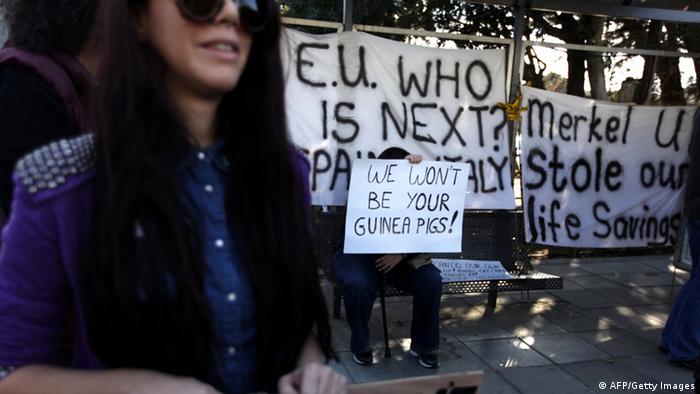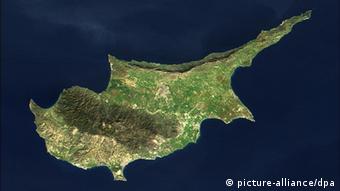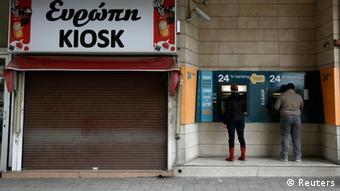The EU has taken a surprisingly relaxed view of the Cypriot parliament's refusal to back a bailout deal. One possible reason could be that eurozone leaders are willing to make an example of Cyprus by letting it fail.
Eurozone finance ministers must have known there would be opposition, but that not a single Cypriot parliamentarian would vote in favor of the EU bailout seems to have surprised even them. Now they are left grasping at straws to figure out what to do next.
German Finance Minister Wolfgang Schäuble gave his view on Tuesday, and calming the entire eurozone seemed to be his main goal by saying he regretted the entire situation and that the offer was "still on the table." He added that the size of the finance sector in Cyprus made it "a very specific, unique case" for the common currency area. His comments were intended to make clear that depositors in other countries would not be called upon to take part in the bailout.
"We have taken sufficient precautions so that the decision in Cyprus will not have a negative effect on the rest of the eurozone," he said.
The European Central Bank will again temporarily step in to help Cyprus and provide fresh money while the government continues its search for an answer to the crisis.
Ball in Cyprus' court
The eurozone finance ministers were ready for another meeting but said it's up to Cyprus to make the next move.
"It is now for the Cypriot authorities to present an alternative scenario," EU Commission spokesperson Olivier Bailly said on Wednesday, adding that any plan would have to meet debt sustainability criteria and financing parameters.
Such regulations mean Cyprus has to come up with 5.8 billion euros of its own in order to receive a rescue package and if the plan does not rely on depositors' savings it would require the renewed approval from euro finance ministers.
The Commission put the decision on whether to pay for its portion of the bailout with a one-time tax on bank deposits less than 100,000 euros squarely on the Cypriot government. It was this proposal that caused the loudest uproar both in Cyprus and the rest of Europe. The EU Commission, Bailly said, pushed for savings under 100,000 euros to be excluded from the tax, "but the Cypriot authorities did not accept such an alternative scenario."
The four possibilities
Overall, there are four possible scenarios:
1. The Cypriot parliament becomes newly aware of the seriousness of the situation and gives in and calls for a levy on private deposits. That would be accompanied by the rescue package promised by the EU Troika, which is made up of the European Union, the European Central Bank and the International Monetary Fund. Or the government in Cyprus finds another way to get the billions it needs to pay for the bailout. Whether eurozone finance ministers would agree to such a plan B would depend on exactly who would end up paying.
2. The EU fears the crisis in Cyprus would spread to other euro nations and decides to take on the 5.8 billion euros in debt itself. The sum, after all, is tiny compared to the hundreds of billions the bloc has already paid in rescue packages and loan guarantees. This scenario, however, remains unlikely as there does not seems to be enough will among politicians to tell tax payers they have to bail out Russian oligarchs who deposited their money in Cyprus. Particularly in Germany, where elections will be held in September, there is not a single political party that would back such a move.
3. Cyprus could let Russia come to its rescue and not touch deposits so that the country would remain attractive to foreign investors. In exchange, Russian companies would get extraction rights to Cyprus' gas reserves. Whether such a plan came up during a phone call between the two countries' presidents, Cyprus' Nicos Anastasiades and Russia's Vladimir Putin, on Tuesday is unclear. Putin did, however, tell his Cypriot counterpart to protect the deposits of Russian individuals and companies. Cyprus' finance minister traveled to Moscow on Wednesday for talks. A rescue from Russia would be an affront to the EU, which wants to prevent Moscow from buying its way into influencing EU member states. The bloc is also currently working to become less dependent on Russian energy. A European Commission delegation will travel to Moscow at the end of the week and energy and Cyprus are sure to be among the topics discussed.
4. The EU lets Cyprus go bankrupt. It would be a dramatic turn away from current policy. Until now, there has always been a consensus that all members of the common currency would be prepared to pay nearly any price. But doubts have surfaced recently as to whether Cyprus is too big to fail relative to the entire eurozone. The eurozone finance ministers may have reached the stage where they might be willing to risk a nation's insolvency in the hope that the consequences are limited. A sign that the effects could, indeed, be limited is that key stock markets indexes in Frankfurt and London rose on the day after Cypriot lawmakers rejected the levy proposal.
Fears of capital flight
Cyprus' Orthodox Church has presented an unorthodox plan. It said it was willing to take out mortgages and buy state bonds to help the government. Exactly how much this would net for the failing financial institutions is unclear.
Banks in Cyprus will likely remain closed, though customers can still withdraw small amounts from automatic teller machines. A ban on foreign transfers is likely to remain in place as the government works to prevent capital exodus, which will be nearly impossible to avoid when banks reopen. dw de




Comments